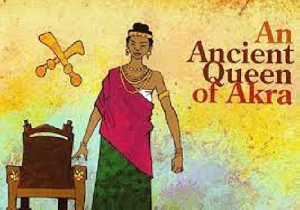The story of the wicked Ga queen who stole her way to power but died a miserable death

After his death, Dode Akabi, the Princess of Obutu, immediately came into the scene, usurped power and installed her authority over the people of Akra (now Accra), beginning a tenure of ruthless rule by the woman described as “an intelligent and masculine woman.”
Captured in a book titled, ‘History of the Gold Coast and Asante, Third Edition’ and authored by Carl C. Reindorf, the story of this queen is told.
According to the narration, immediately Dode Akabi rose to the throne, albeit illegally, she exerted her authority over the people, initiating some of the most unheard-of things among the people, such as face-cut marks.
“After the death of King Okai, Dode Akabi, an intelligent and masculine woman and Princess of Obutu, took possession of the king’s property, usurped the government, knowing that after her death, the young Prince Okaikoi might aspire to the throne. Dode Akabi ruled both the Akras and Obutus with a rod of iron. She invented the Akra face-cut marks, although some people are of opinion that the first Akra immigrants had such marks on their faces,” portions of the book stated.
Dode Akabi was also very daring in her commands to her people. Further accounts of her story showed that she once asked for a live tiger or lion to be caught for her – a situation that let to the death of many.
She also commanded that all old men be killed until the last one standing made her take a more forthright decision.
“She also commanded the men not to use the abusive expression ‘bulu’ or brute to a wife, on pain of death. Her other injunctions were very foolish and cruel, such as to capture a live tiger or lion for her. Many lives were lost in efforts made to carry out her orders.
“In giving the order to build her palace, she stipulated that it should not be thatched with grass but with clay. She also commanded the young men in her dominions to do away with all the old and elderly men. This wicked order was executed except in one family where the father’s life was spared.
“When Dode Akabi was urging her people to build the palace and to use swish strings in thatching it, no one knew how to carry out the order. The old man whose life had been saved advised his sons to ask for a sample of the old swish strings used when the palace of her predecessor was thatched so as to imitate it. When this request was made, she knew at once that one of the old men was alive, and ordered the people to tell her the truth. When she was told, she ordered the old man to be brought to her; and he made such a clear demonstration to her that she abandoned her idea of roofing a grass house without the natural materials. This was the origin of constituting seven elders as councillors to advise kings and chiefs in every town,” it added.
And like all tales, there was sure to be an end to the brutality of this queen but she never quite saw it coming.
After one of her usual unbelievably difficult orders, the young men who took out the order saw a small window of opportunity to permanently bring an end to her suppression.
Knowing too well that she insanely abhorred disobedience, the young men hatched the perfect lie and got her to descend into a well she had asked to be dug for her, and when she had, they put to an end to her.
“Dode Akabi’s death is said to have happened through an order she gave to sink a well in the hill known as Akabikenke (Akabi’s hill). The people had no proper tools and were compelled to sink a well some hundred feet deep. Their rigid taskmasters were very hard upon them, in fact, like the European taskmasters; and at last, the poor, oppressed and afflicted people conspired the life of the Queen.
“In order to carry out their plot, it was announced that water was discovered, but a man was at the bottom of the well who forbade them to dig any further. The angry Queen with her women retinue rushed to the spot, arrogantly demanding who the man was who dared to impede her work.
“‘He is at the bottom of the well,’ was the reply. In a great rage she ordered them to lower her down to see the man who ventured to oppose her will. She was lowered accordingly, and when she had reached the bottom, the people shouted: ‘In future that is your abode!’ In a moment a multitude of stones, sticks and rubbish was thrown into the well to fill it up. All the workmen engaged, as well as those from the town, carried stones and earth and threw them in; and those coming late threw stones in heaps all around the well being quite full.
“Thus ended the cruel and wicked reign of Dode Akabi, which is still remembered by two proverbs: ‘Twine should be twisted according to the ancient samples’; and ‘Never cut your hair like that of Tete when your head is not the same shape.’ This referred to the queen who was not of the royal blood of Akra and should not have assumed the supreme power,” it added.
Read even more details in the attached snippets from the book:

CLICK HERE TO DOWNLOAD PRESS RADIO MOBILE APP

EA/WA
Source: www.ghanaweb.com







